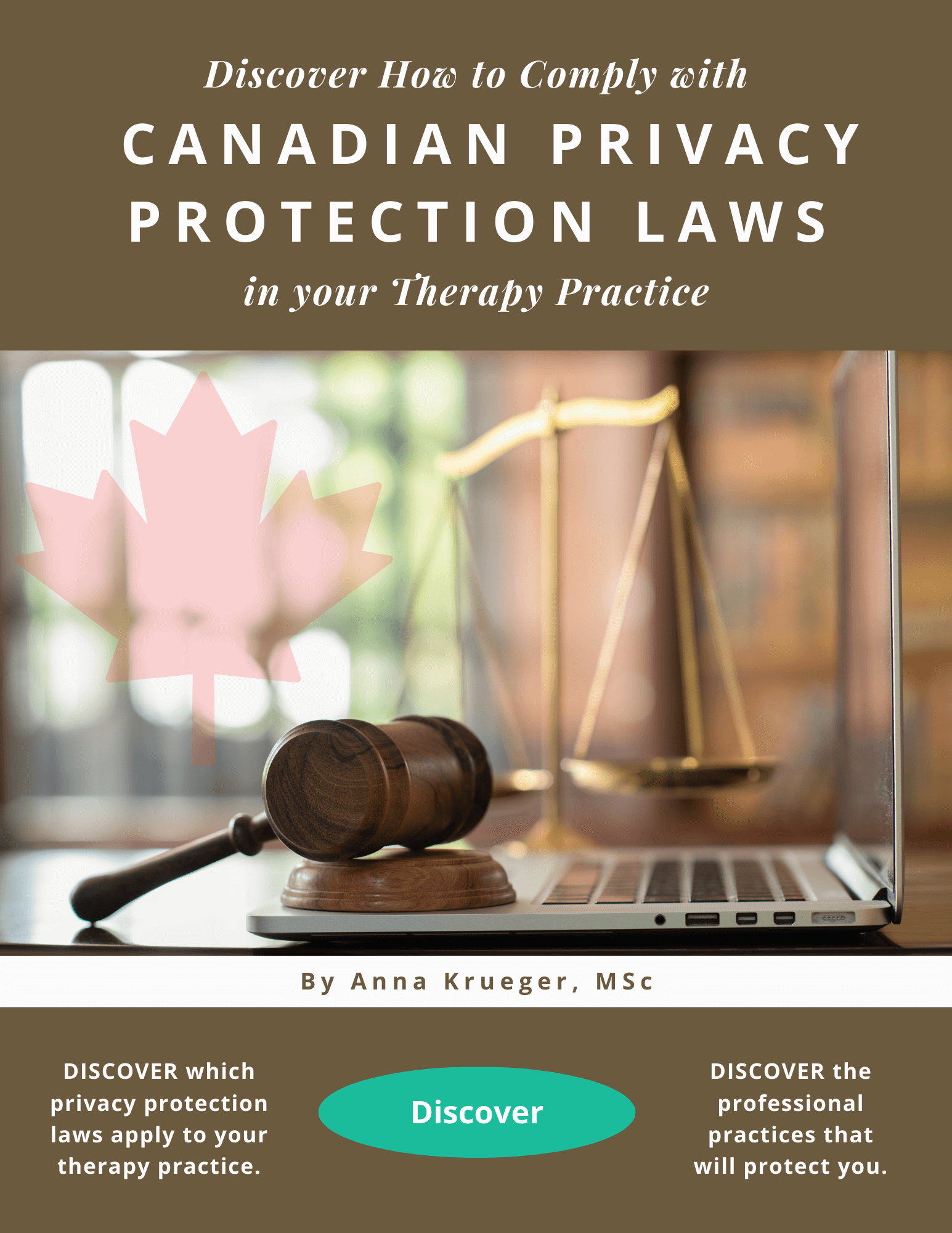
Legal Obligations for Employees, Contractors and Entrepreneurs
Legal Obligations for Therapists Working as Employees
It's crucial to stay informed about your legal obligations as an employee. These responsibilities ensure not only your safety but also the well-being of your clients. Here's a breakdown of the key obligations you need to keep in mind:
Complying with Licensing Requirements and Continuing Education
It's your duty to adhere to the licensing requirements for your profession. This often involves engaging in continuing education to stay updated on the latest legal and ethical guidelines. By doing so, you ensure that your practices are not only compliant but also aligned with evolving standards of care.
Adhering to Confidentiality Policies
Confidentiality is at the core of building trust with your clients. As a therapist, you're required to adhere to privacy protection laws for your country and region. Your employer may have internal confidentiality policies that you must also follow diligently. It's all about maintaining a secure and respectful environment where clients feel safe to share their personal information.
If you don't have my free e-book yet, click on the image for more information.
Reporting Abuse or Ethical Violations
Situations may arise where you suspect or become aware of abuse or ethical violations. In such cases, you're legally obligated to report these incidents. This includes instances of child abuse, elder abuse, or any scenario where a client is at risk of harm. Familiarize yourself with the mandatory reporting laws in your region and your ethical responsibilities. This knowledge not only protects your clients but also upholds your professional integrity.
Navigating these legal obligations might seem daunting at first, but they're integral to your role as a therapist. By staying informed and compliant, you're fostering a safer, more ethical space for your clients and yourself. Remember, your dedication to continuous learning and ethical practice reflects the heart of your profession.
Legal Obligations for Therapists Working as Contractors
As a therapist working as a contractor, you might find yourself navigating a unique landscape of responsibilities and obligations. Here are some essential areas you should be familiar with.
Filing Taxes as a Self-Employed Individual
One of the key differences between being an employee and a contractor is how taxes are managed. Unlike traditional employees who have their taxes deducted automatically, as a contractor, you are responsible for filing your own taxes. This often means making quarterly estimated payments to stay on top of obligations. A good grasp of tax deductions available to self-employed individuals—such as those for office space, licensing fees, and other business-related expenses—can significantly reduce your tax liability and keep more of your earnings in your pocket.
Maintaining Professional Licensure and Independent Liability Insurance
Ensuring your professional licensure is up to date is another critical responsibility. As a contractor, you are on your own when it comes to keeping your credentials current. Equally important is securing your own malpractice insurance, as you won't have the coverage that employees typically enjoy from their employers. This protects not just your practice but also your peace of mind, knowing that you have taken steps to mitigate potential risks.
Negotiating Contracts and Understanding the Terms of Service Agreements
Before you begin working with any contracting agency or client, thoroughly reviewing and negotiating your contracts is essential. These service agreements are not just formalities; they detail critical aspects such as pay rates, responsibilities, and termination policies. Taking the time to understand and negotiate the terms can help you avoid disputes and ensure fair compensation for your hard work and expertise.
By staying informed and proactive in managing these legal and financial obligations, you can focus more on what you do best—providing excellent care to your clients.
Legal Obligations for Therapy Private Practice Owners
Starting and managing a private practice comes with its own set of legal responsibilities that you need to manage carefully. As you embark on your journey as a private practice owner, one of your first steps will be to ensure your business is properly registered. This process varies by location, but generally, you’ll need to follow these steps.
Forming a Legal Entity
Decide what type of business entity suits your needs. This decision impacts your taxes, liability, and business operations.
Obtaining Necessary Permits and Licenses
Depending on your field, you may need specific licenses to operate legally. Make sure to research the requirements in your location and secure any needed business licenses. Compliance with laws allows your practice to thrive on a solid legal footing.
Complying with Privacy Protection Requirements
When it comes to handling sensitive information, protecting your clients’ confidentiality is paramount. Here are three ways to do that:
- Implement Secure Electronic Health Records: Use systems that are designed to protect patient data from unauthorized access.
- Utilize Encrypted Communication Channels: Whether it’s emails or text messages, make sure your communication methods are secure.
- Maintain Proper Documentation Procedures: Keep meticulous records, ensuring they are stored safely and can be accessed only by authorized personnel.
Guarding against Risks
Running a private practice also means protecting yourself and your business from potential legal issues.
Buy Professional Liability Insurance. This is a non-negotiable step to safeguard against lawsuits that might arise from your professional services.
Understand Legal Risks. Familiarize yourself with potential risks such as breaches of confidentiality and ethical violations. Knowledge is power, and understanding these risks will help you implement effective risk management strategies.
By obtaining liability insurance and staying informed about legal risks, you’re setting yourself up for long-term success and stability in your practice. Each step you take towards compliance not only protects you but also enhances the trust and confidence your clients have in your practice.
Free 30-Minute Workshop for Private Practice Therapists!
- Discover the three biggest website mistakes made by private practice therapists
- Walk away with an understanding of the changes you need to make to your website
- Feel confident about being an entrepreneur, finally having a vision for a strategic website that will help you build your therapy practice
"After this workshop, I finally started thinking about the FUNCTION of my website, not just the look."
More of...
- Referrals
- Confidence
- Ease & Balance
Less of...
- Inefficiency
- Frustration
- Low Income


Skills Needed by Therapists working as Employees, Contractors or Entrepreneurs
Essential Skills for Thriving as an Employee
If you're navigating the world of therapy as an employee, whether in a hospital, clinic, or agency setting, there are a few key skills you'll want to master to ensure you're providing the best care for your clients and thriving in your role. Let's dive into these must-have skills!
Hone Your Clinical and Diagnostic Skills
First up, your ability to assess and treat clients effectively is paramount. You'll need a solid grasp of clinical skills, which starts with diagnosing mental health conditions accurately. Conducting thorough risk assessments and knowing how to implement the right therapeutic interventions can make all the difference. Being familiar with a variety of therapy modalities, such as cognitive-behavioral therapy, psychodynamic therapy, and trauma-informed care, is critical. These tools will empower you to support a diverse array of clients effectively. It’s all about having that well-rounded toolbox to draw from!
Team Up for Success
Next, let’s talk about teamwork. In many settings, you'll be part of a multidisciplinary team where collaboration is key. Being able to communicate effectively and work harmoniously with other professionals is essential. This not only enhances the treatment plans and care you provide but also enriches the entire treatment process for your clients. Whether you're in a hospital or an agency, having multiple minds working together can create truly comprehensive care.
Master the Art of Documentation
As a therapist, being proficient in maintaining accurate and up-to-date documentation is essential. Many organizations rely on Electronic Health Records (EHR). You'll need a keen eye for detail and the ability to juggle paperwork alongside your clinical duties. This skill ensures that everything runs smoothly behind the scenes and that your clients' records are always in tip-top shape.
Key Skills needed to Thrive as an Independent Contractor
Independent contractors are self-employed, working for multiples agencies, practices or telehealth platforms. If you want to work as a contractor, you will need business skills in addition to your clinical skills.
Business and Financial Management Skills for Tracking Income and Taxes
As an independent contractor, you're your own boss, which means you're in charge of managing your own finances. You'll need to keep an eye on your income from various sources, set aside money for taxes, and keep meticulous records of your business expenses.
Strong Self-Discipline and Organization for Managing Appointments and Documentation
One of the biggest differences between being an employee and a contractor is that you won't have an admin team to handle your scheduling and paperwork. With strong organizational skills, you'll be able to manage your client appointments, keep track of progress notes, and stay on top of your billing requirements. It's all about finding a system that works for you and sticking to it.
Ability to Network and Market Services to Maintain a Steady Caseload
As a contractor, you don't have the luxury of a guaranteed client base. You'll need to actively network and market yourself to secure a steady stream of work. This might mean reaching out to agencies, joining referral networks, or using online platforms to showcase your skills and attract new clients.
Essential Skills for Entrepreneurs in Private Practice
If you want to be private practice owner, certain skills are absolutely essential to pave the way for your success. It's not just about having passion and expertise in your field, but also mastering the business side of things. Let's dive into the skills you'll need to create a flourishing practice.
Business Savvy: Mastering Financial Acumen
Running a successful private practice means having a strong grip on budgeting, financial planning, and cash flow management. You'll need to be adept at setting competitive service rates, tracking expenses, and handling invoicing and funding reimbursements. Navigating the world of taxes and maintaining financial stability might sound daunting, but your savvy skills will ensure your practice stays afloat and flourishing.
Crafting Your Brand: Marketing and Client Engagement
Without an agency to guide clients your way, you become your own marketing powerhouse. Developing a professional and engaging website is your main tool to attract and retain clients. Building a strong personal brand not only establishes your credibility but also keeps your client base steadily growing. Your authentic voice and effective marketing strategies will shine through, drawing clients to your expertise like a magnet.
Effortlessly Handling Admin and Compliance
As the backbone of your practice, your administrative skills keep everything running smoothly. You'll expertly navigate the world of scheduling, record-keeping, and client communications. Ensuring compliance with laws and regulations might sound tedious, but with a solid system in place, these tasks become second nature, allowing you to focus on what you do best—providing excellent service to your clients.
Embarking on the entrepreneurial path is an exhilarating adventure. By honing these essential skills, you'll not only manage your private practice with confidence but also create a thriving, reputable business that stands out.
Free 30-Minute Workshop for Private Practice Therapists!
- Discover the three biggest website mistakes made by private practice therapists
- Walk away with an understanding of the changes you need to make to your website
- Feel confident about being an entrepreneur, finally having a vision for a strategic website that will help you build your therapy practice
"After this workshop, I finally started thinking about the FUNCTION of my website, not just the look."
More of...
- Referrals
- Confidence
- Ease & Balance
Less of...
- Inefficiency
- Frustration
- Low Income


Do you Want to Be an Entrepreneurial Therapist who Builds a Private Practice?
Starting your own therapy practice as an entrepreneur can be both exciting and challenging. Unlike working as an employee or contractor, you have full control over your business decisions, client base, and income. While private practice comes with financial and administrative responsibilities, it also offers a level of freedom and fulfillment that many therapists find rewarding. If you’re considering taking the leap into entrepreneurship, here’s what you need to know.
HR Benefits: Taking Charge of Your Own Security
One of the key differences between being an entrepreneur and working for someone else is that you don’t receive employer-provided benefits. This means you’ll need to arrange your own health insurance, retirement plans, and paid time off. While this adds an extra layer of financial planning, it also gives you the flexibility to choose the best options for your needs rather than being limited to an employer’s offerings. Many private practice owners invest in self-employed retirement plans and group health insurance options to create long-term financial security.
One major perk of being your own boss is the ability to structure your work-life balance according to your personal and business goals. You’re not bound by someone else’s schedule or policies, meaning you can design a workload that allows you to enjoy time with family, travel, or pursue other interests while maintaining a sustainable income. This flexibility is a key reason many therapists transition to private practice.
As your practice grows, you also have the opportunity to hire employees or subcontractors, allowing you to expand your business beyond solo work. Whether you bring on administrative support, other therapists, or clinical interns, scaling your practice can increase your revenue and reduce your workload in the long run. This entrepreneurial growth potential is something you won’t find in traditional employment or contract work.
Freedom and Fulfillment: The Power to Shape Your Own Success
One of the biggest advantages of running your own practice is having full control over your policies, rates, and therapeutic approach. Unlike employees who must follow workplace guidelines or contractors who abide by agency contracts, you decide how you want to run your practice. From setting session fees to choosing your ideal client base, private practice allows you to align your business with your personal and professional values.
While self-employment comes with financial risks, it also offers higher earning potential in the long term compared to being an employee or contractor. Since you set your rates and don’t have to split fees with an employer, your income is directly tied to your efforts. Once your practice is established, you can maximize your earnings while maintaining a schedule that works for you. With smart business strategies and steady client referrals, many therapists find they can earn significantly more than in traditional employment.
Perhaps the most fulfilling aspect of entrepreneurship is the deep sense of accomplishment that comes from building a business that reflects your vision. When you run your own practice, you’re not just working—you’re creating something meaningful that serves your clients in a way that feels authentic to you. The ability to shape your career, make a direct impact on your clients, and grow professionally on your own terms makes entrepreneurship one of the most rewarding paths in the therapy field.
Is Private Practice Right for You?
Entrepreneurship isn’t for everyone, but if you value freedom, financial growth, and the ability to build something of your own, private practice can be an incredibly rewarding path. While it requires strong business skills, financial planning, and self-motivation, it also offers unmatched flexibility and control over your career. If you’re ready to take charge of your professional future, starting your own practice could be the best decision you ever make.
Free 30-Minute Workshop for Private Practice Therapists!
- Discover the three biggest website mistakes made by private practice therapists
- Walk away with an understanding of the changes you need to make to your website
- Feel confident about being an entrepreneur, finally having a vision for a strategic website that will help you build your therapy practice
"After this workshop, I finally started thinking about the FUNCTION of my website, not just the look."
More of...
- Referrals
- Confidence
- Ease & Balance
Less of...
- Inefficiency
- Frustration
- Low Income










